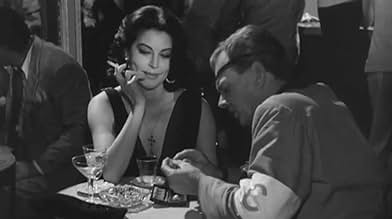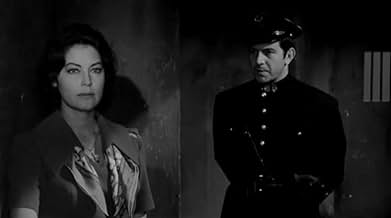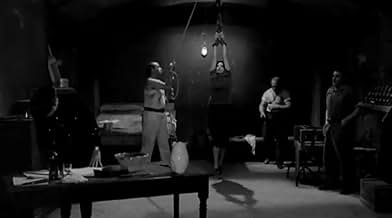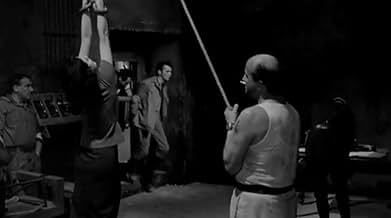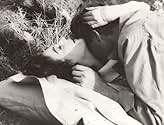VALUTAZIONE IMDb
5,8/10
910
LA TUA VALUTAZIONE
Aggiungi una trama nella tua linguaFather Arturo Carrera leaves the priesthood over the church's indifferent position during the Spanish Civil War, but finds himself attracted to beautiful entertainer Soledad.Father Arturo Carrera leaves the priesthood over the church's indifferent position during the Spanish Civil War, but finds himself attracted to beautiful entertainer Soledad.Father Arturo Carrera leaves the priesthood over the church's indifferent position during the Spanish Civil War, but finds himself attracted to beautiful entertainer Soledad.
- Regia
- Sceneggiatura
- Star
Robert Bright
- Father Idelfonso
- (non citato nei titoli originali)
Franco Castellani
- José
- (non citato nei titoli originali)
Nino Castelnuovo
- Capt. Trinidad
- (non citato nei titoli originali)
Robert Cunningham
- Mac
- (non citato nei titoli originali)
Gustavo De Nardo
- Maj. Garcia
- (non citato nei titoli originali)
Franco Fantasia
- Cabaret Customer
- (non citato nei titoli originali)
Armando Fracassi
- Nationalist Prisoner
- (non citato nei titoli originali)
Recensioni in evidenza
There's an interesting story here on a number of levels but at roughly 1:40 minutes there's not enough time to tell them all well, which it tries to do. Really didn't understand the point of Joseph Cotten's journalist, even as an expository device. I'll leave criticisms or praise of the treatment of the civil war to others with more than the passing knowledge I have. Someone noted the cramped and dark cinematography, which worked for some scenes but not what might have been some of the more grand-scale scenes, which looked like they were cropped or framed so as not to admit incongruous sites or things into the shots. The lovers are a bit too aware of their fate it seems for them to have a realistic relationship. This one's OK for a watch but for characters bound up in a tragic relationship during revolution and civil war, it is no Dr. Zhivago.
This film has an abiding place in my film canon, for one very good reason.
It isn't a great film, as both the other IMDb reviewers have gone out of their way to stress (although some of their criticisms were a little unfair. I thought, for example, that Joseph Cotten fared better than they say). However, it is virtually the only entertainment vehicle I have ever seen - including film, TV, radio, newspaper, magazine - that dares to show the truth about the left-wing Republicans/anti-Nationalists in the Spanish Civil War.
The Spanish Republicans have been lionised for decades for their allegedly heroic struggle against fascism (although it is actually a moot point to what extent Franco's Nationalists were fascist). However, this film is brave enough to show the truth - that the Spanish Republicans singled out religious targets and many harmless middle class targets and killed or persecuted them. It also dares to show the truth that the Republicans ran the areas they controlled along Stalinist lines. Which is not surprising, given the links with Communists and Stalinist Russia that some of them had.
The file deserves enormous credit for showing this, and it is a shame that no-one has pointed this out on IMDb - until now.
It isn't a great film, as both the other IMDb reviewers have gone out of their way to stress (although some of their criticisms were a little unfair. I thought, for example, that Joseph Cotten fared better than they say). However, it is virtually the only entertainment vehicle I have ever seen - including film, TV, radio, newspaper, magazine - that dares to show the truth about the left-wing Republicans/anti-Nationalists in the Spanish Civil War.
The Spanish Republicans have been lionised for decades for their allegedly heroic struggle against fascism (although it is actually a moot point to what extent Franco's Nationalists were fascist). However, this film is brave enough to show the truth - that the Spanish Republicans singled out religious targets and many harmless middle class targets and killed or persecuted them. It also dares to show the truth that the Republicans ran the areas they controlled along Stalinist lines. Which is not surprising, given the links with Communists and Stalinist Russia that some of them had.
The file deserves enormous credit for showing this, and it is a shame that no-one has pointed this out on IMDb - until now.
10clanciai
This is a fascinating story with many aspects and undertones of fathomless depth and a very different view of the Spanish civil war than what is usually represented. The drama grips you at once, as the young priest leaves the church demonstratively in protest, which immediately throws you into an interesting development of character and events, as the civil war breaks out. Joseph Cotten is an American journalist who gives the drama a form, but Ava Gardner is the central figure, 'the angel in red', a prostitute in a night club which the unfrocked priest finds himself at home in. Another character is Aldo Fabrizi, who here repeats his martyrdom from "Rome, open city" as the carrier of the one holy thing still remaining as a hope for the people, a relic with a drop of a saint's blood with apparently tremendous national meaning to both believers and non-believers. On top of it all there is Vittorio de Sica as the general who better than anyone else sees through the utter absurdity and madness of this civil war.
It is possibly the best film of the Spanish civil war that has been made, in spite of its foibles, as it presents a fairer and broader insight into the war than any other film I have seen on this bloody mess, which almost went on from 1936 until the year of the second world war, as an introduction. The love story is totally convincing and 'organic', as Polanski would have said, but the pathos of the film is tremendous, almost giving a documentary presentation of the war but from below, from the view of common people, a prostitute, a defrocked priest and innocent victims. It's like one of Graham Greene's best novels, but the music adds an extra dimension of beauty and infinite suffering and sorrow as well, like to the shocking war pictures of Goya. It's a great film, it can't be denied, and its lacks and wants are not enough to reduce anything of its deeply human and fascinating greatness.
It is possibly the best film of the Spanish civil war that has been made, in spite of its foibles, as it presents a fairer and broader insight into the war than any other film I have seen on this bloody mess, which almost went on from 1936 until the year of the second world war, as an introduction. The love story is totally convincing and 'organic', as Polanski would have said, but the pathos of the film is tremendous, almost giving a documentary presentation of the war but from below, from the view of common people, a prostitute, a defrocked priest and innocent victims. It's like one of Graham Greene's best novels, but the music adds an extra dimension of beauty and infinite suffering and sorrow as well, like to the shocking war pictures of Goya. It's a great film, it can't be denied, and its lacks and wants are not enough to reduce anything of its deeply human and fascinating greatness.
"The Angel Wore Red" is a 1960 film that takes on the subject of the Spanish Civil War. It stars Dirk Bogarde, Ava Gardner, Joseph Cotten, Vittorio de Sica, and Finlay Currie. The Spanish Civil War is not an easy subject and unfortunately, the film only partially succeeds with Nunnally Johnson's script and under his direction.
A priest, Arturo Carrera (Dirk Bogarde) gives up the priesthood just as the war is starting and finds himself on the run from the Spanish Republicans, who accused the priests of indoctrinating their followers against them. Arturo slips into a cabaret in order to hide and meets Soledad (Gardner), an entertainer. Eventually, he falls for her, and both of them wind up being arrested. Meanwhile, both sides are searching for a sacred relic that is believed to have miraculous powers - it is said to have helped defeat Napoleon. The Bishop entrusted it to someone before the cathedral was destroyed. Each side wants it for its own reasons.
This is a very dark film - darkly photographed, and the sound is strange. I am glad someone else mentioned that it seemed as if it was dubbed. I could easily believe it was in Italian originally and dubbed in English, though that wasn't the case. The acting is excellent. Movie priests always look so darn good - Bogarde makes a handsome, romantic and gentle priest and gives a dynamic performance as a man who hasn't lost his faith in God, only in the church as a way to serve man. Ava Gardner is well cast. Some comments state she was "past it" etc. - though she looks older than Bogarde, which really doesn't make any difference, she also looks appropriate for the role she plays - Spanish, someone who's been around the block more than once, likes the nightlife and is not wealthy. She is not particularly well photographed, and in spots where she is, it's obvious that her beauty hasn't faded. All anyone has to do is see her in 1964's "Night of the Iguana" to realize what great beauty she still had. Vittoria di Sica plays General Clave; it's an odd performance, which is fitting because the man he plays is odd. Joseph Cotten to me is completely wasted as a news journalist in this movie and seems just inserted into the film. He's excellent, but the performance comes from nowhere.
In the end, "The Angel Wore Red" doesn't give us much understanding of the conflict, and the viewer feels almost as if he or she is entering in the middle of something. We're actually entering in the beginning of the Spanish Civil War, but nothing leads us up to it. Props to Johnson, however, for taking on such a weighty subject.
A priest, Arturo Carrera (Dirk Bogarde) gives up the priesthood just as the war is starting and finds himself on the run from the Spanish Republicans, who accused the priests of indoctrinating their followers against them. Arturo slips into a cabaret in order to hide and meets Soledad (Gardner), an entertainer. Eventually, he falls for her, and both of them wind up being arrested. Meanwhile, both sides are searching for a sacred relic that is believed to have miraculous powers - it is said to have helped defeat Napoleon. The Bishop entrusted it to someone before the cathedral was destroyed. Each side wants it for its own reasons.
This is a very dark film - darkly photographed, and the sound is strange. I am glad someone else mentioned that it seemed as if it was dubbed. I could easily believe it was in Italian originally and dubbed in English, though that wasn't the case. The acting is excellent. Movie priests always look so darn good - Bogarde makes a handsome, romantic and gentle priest and gives a dynamic performance as a man who hasn't lost his faith in God, only in the church as a way to serve man. Ava Gardner is well cast. Some comments state she was "past it" etc. - though she looks older than Bogarde, which really doesn't make any difference, she also looks appropriate for the role she plays - Spanish, someone who's been around the block more than once, likes the nightlife and is not wealthy. She is not particularly well photographed, and in spots where she is, it's obvious that her beauty hasn't faded. All anyone has to do is see her in 1964's "Night of the Iguana" to realize what great beauty she still had. Vittoria di Sica plays General Clave; it's an odd performance, which is fitting because the man he plays is odd. Joseph Cotten to me is completely wasted as a news journalist in this movie and seems just inserted into the film. He's excellent, but the performance comes from nowhere.
In the end, "The Angel Wore Red" doesn't give us much understanding of the conflict, and the viewer feels almost as if he or she is entering in the middle of something. We're actually entering in the beginning of the Spanish Civil War, but nothing leads us up to it. Props to Johnson, however, for taking on such a weighty subject.
The Angel Wore Red is one of the few films in the English speaking world that
deals with the Spanish Civil War. It takes an even handed approach to the
conflict as well.
The military high command in the Spanish Republic withdrew its support from the civil government that came into power after the Spanish monarchy was overthrown in 1931. The Nationalist had disciplined troops and the backing of the Catholic Church. The Republican government cobbled together an army and it fought as best it could from 1936 to 1939.
Dirk Bogarde decides to leave the church at the worst possible time when the city he was posted to is under siege. Those left wing folks occupying the city were very anti-Catholic and they were rounding up priests as spies for the Nationalists. When the Nationalists take the city he's got a problem with them in that they don't quite buy him either. The only one who seems to get him is Ava Gardner playing a bar entertainer who gets by the best she can. When you've been celibate you can imagine how intense it must have been.
There's also a religious relic that the church has, a drop of blood from St.John the Divine. Both sides want to possess it.
This tale is told from neutral correspondent Joseph Cotten who with his eye patch is modeled on Floyd Gibbons. He's quite cynical about the war and is not believing all the fuss about this religious relic. But the phenomenon is there for him to report.
According to Lee Server's biography of Ava Gardner, both she and Bogarde were most dissatisfied with how MGM distributed the film. Both felt they did good work and they did and wished more had seen the film.
It's something you should see if you can.
The military high command in the Spanish Republic withdrew its support from the civil government that came into power after the Spanish monarchy was overthrown in 1931. The Nationalist had disciplined troops and the backing of the Catholic Church. The Republican government cobbled together an army and it fought as best it could from 1936 to 1939.
Dirk Bogarde decides to leave the church at the worst possible time when the city he was posted to is under siege. Those left wing folks occupying the city were very anti-Catholic and they were rounding up priests as spies for the Nationalists. When the Nationalists take the city he's got a problem with them in that they don't quite buy him either. The only one who seems to get him is Ava Gardner playing a bar entertainer who gets by the best she can. When you've been celibate you can imagine how intense it must have been.
There's also a religious relic that the church has, a drop of blood from St.John the Divine. Both sides want to possess it.
This tale is told from neutral correspondent Joseph Cotten who with his eye patch is modeled on Floyd Gibbons. He's quite cynical about the war and is not believing all the fuss about this religious relic. But the phenomenon is there for him to report.
According to Lee Server's biography of Ava Gardner, both she and Bogarde were most dissatisfied with how MGM distributed the film. Both felt they did good work and they did and wished more had seen the film.
It's something you should see if you can.
Lo sapevi?
- QuizThe film was originally planned to be shot on-location in Spain. However, due to the unflattering portrayal of Nationalists in the Spanish Civil War, the Franco regime declined permission.
- BlooperWhen the prisoners are being marched for several days to be presented to the fascists, the group contains a substantial number of women. At least two women are shown confessing to Arturo. But when the fascists capture the group, Arturo tells the commander that the group consists of 200 men who should not be killed, no mention of women. When Arturo enters the church to tell the prisoners they are to be executed, the group is all men. The women have vanished.
- ConnessioniFeatured in Best in Action: 1960 (2018)
I più visti
Accedi per valutare e creare un elenco di titoli salvati per ottenere consigli personalizzati
- How long is The Angel Wore Red?Powered by Alexa
Dettagli
Botteghino
- Budget
- 1.843.000 USD (previsto)
- Tempo di esecuzione1 ora 35 minuti
- Colore
- Proporzioni
- 1.85 : 1
Contribuisci a questa pagina
Suggerisci una modifica o aggiungi i contenuti mancanti

Divario superiore
By what name was La sposa bella (1960) officially released in India in English?
Rispondi

